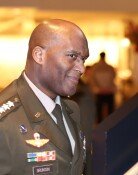[Column] Is the president really ``prepared``?
[Column] Is the president really ``prepared``?
Posted April. 12, 2001 12:47,
![[Column] Is the president really ``prepared``?](https://dimg.donga.com/egc/CDB/ENGLISH/Article/20/01/04/12/2001041212348.jpg)
In the presidential race of 1997, Kim Dae-Jung ran on the slogan ``a prepared president.`` A prepared president appealed to the people unnerved by a financial crisis that came upon them all of a sudden and called for a bailout by the International Monetary Fund.
Then, what has become of the Kim administration in the past three years? More and more people are troubled by the confusion stemming from mistaken reforms, rather than remaining expectant of ``prepared reforms`` by a prepared president. Reforms are considered more difficult than revolutions. Only firm principles, a clear direction and elaborate preparedness could straighten out these difficulties. The reformer must be armed with moral strength. The presidency of Kim Dae-Jung, however, failed to bring any of the reforms to fruition.
The chief blame can be laid on a lack of preparedness. Reforms will hardly be forthcoming of their own accord. They ought to be programmed in a meticulous and accurate way. They involve much money. Costs need to be accurately calculated and the resources to finance these costly reforms have to be identified ahead of time. An apologetic hindsight that they demanded more money as they proceeded would not justify a slow or unsuccessful reform.
They take time too. A revolution may be pulled off in one day but reforms cannot. It should go through a process of seeking the consent of the other parties through dialogue and persuasion. This process is necessary to minimize negative side effects of reform and maximize positive results. No matter how reform-minded and strong-willed a cabinet member might be, reforms cannot be completed single-handedly. The reforms in the education and medical care systems are powerful examples of the failed restructuring that has been pursued through compulsion and obsession in a short period of time.
Consistent principles must guide reform. The reckless attempts of the government to keep Hyundai Engineering and Construction afloat by fair means or foul did not follow any particular principles. It was a case of testing the relevance of the policy of reforming Korea`s gigantic but foundering conglomerates or chaebol.
Strong power should support reform -- moral power. First of all, advocates of reform must have moral confidence. The so-called civilian-led reform initiated by former President Kim Young-Sam was applauded by the people in the beginning. But as Kim entered the second half of his term and an influence-peddling scandal erupted involving the president`s son Hyun-Chul, the administration`s moral high ground gave way and the fanfare of reforms evaporated.
Then, what about the incumbent government? The name Kim Hyun-Chul was brought up during a meeting of President Kim Dae-Jung and his political lieutenants in the ruling party. Rep. Chung Dong-Young spoke out on the role of Kwon Roh-Kap, member of the Millennium Democratic Party (MDP) supreme council, and compared him to Kim Hyun-Chul. What did he mean by likening Kwon to the disgraced son of the former president? Chung might have meant to warn against a possible repetition of the raft of scandals on political funds and other irregularities that took place during the previous administration. He may also have meant to suggest that a number of shady personalities surround Kwon and that they could also trigger a storm of similar scandals.
Having receded into the background, Kwon returned to the foreground of politics after three months. When the governing party bigwig opened his office, a large number of movers and shakers in the political arena crowded the place. About the same time, a cabinet reshuffle and party reorganization were undertaken, and many of his political colleagues belonging to the inner circle of the Donggyo-dong faction were reinstalled in powerful positions. A former minister dismissed on suspicion of involvement in a graft scandal was appointed to a key post in the presidential office and a former education minister who angered and received condemnation from teachers for his misconceived educational reforms was named chief policymaker of the ruling party. During parliamentary interpellations, opposition lawmakers called the shakeup of the government and party leadership a dictatorship by the Donggyo-dong faction. From this we can gather that members of the inner circle who were the closest aides to President Kim will lead the van of reforms in the remainder of the President Kim`s term of office. It remains to be seen how strongly they can rally behind the professed reforms.
What is more important is the direction of reforms. Mountains of reform agenda remain to be addressed, and yet these priorities appear to be getting lost in the flurry of partisan politicking that is obviously aimed at electing a second MDP government. Worrisome signs are already evident. Typical of them are voices being raised of late in favor of constitutional reform. Strangely enough, President Kim Dae-Jung and the MDP chairman claim that they are not interested in, nor are they planning such a change in the basic law. The have already told their party members to refrain from talking about a constitutional revision. But the talk of reform keeps coming out of Cheong Wa Dae and the ruling party. Either the instructions of the MDP president and chairman are not being heeded by the party members or the instruction to stop talking about the issue is just a sham. One man`s guess is as good as another`s.
The ruling party seems to be stepping up its campaign to shake up the existing political parties by means of an argument over a constitutional amendment and efforts to rein in the critical press to clear the way for a second MDP administration. The government speaks about press reform while barring a reporter from an official news source for having produced too many stories critical of the government. Things certainly have gone overboard, causing fears that the promised reforms are going badly astray.
Euh Kyong-Tack, Chief editorial writer






![“잠만 자면 입이 바싹바싹”…잠들기 전에 이것 체크해야 [알쓸톡]](https://dimg.donga.com/c/138/175/90/1/wps/NEWS/IMAGE/2026/02/23/133404748.3.jpg)
